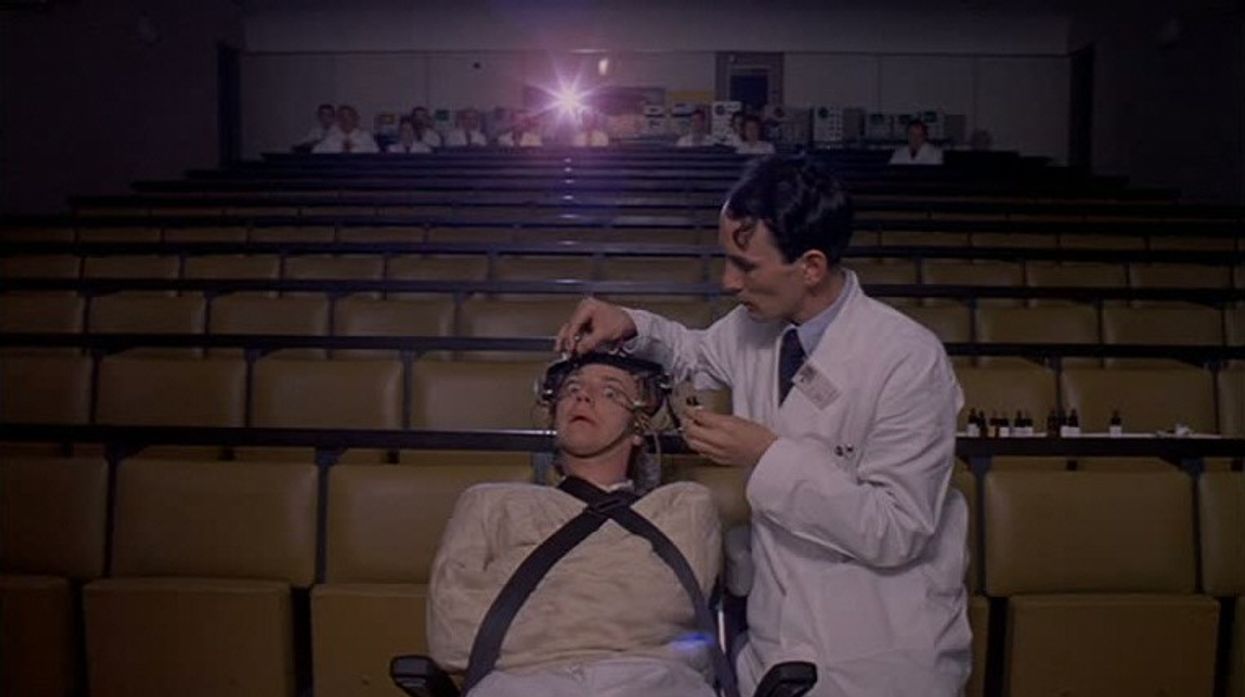Malcolm McDowell & Anthony Burgess Discuss 'A Clockwork Orange' in This 1972 Doc
When Stanley Kubrick's adaptation of Anthony Burgess's novel A Clockwork Orange was released in December, 1971, it generated controversy, as well as acclaim.

Though the film received a rating of "X" in the US, meaning no one under the age of 17 could be admitted, the film still garnered a "Best Picture" nomination at the Academy Awards and had extremely positive notices, like this one from the New York Times. In the review, Vincent Canby noted that while he thought 2001 was, in spirit, an American film, ACO was much more "an essentially British nightmare...in its attentions to caste, manners, accents and the state of mind created by a kind of weary socialism." During the height of this controversy, Burgess, author of the novel, and Malcolm McDowell, the film's star, appeared on a British television program to discuss the film along with film historian William Everson:
In Great Britain, the response to the film was a far cry from the ecstatic response it received on the other side of the Atlantic. There were reports of violence connected with the film during its 61 week run in theaters. The film, which also received an "X" in Great Britain, led to howls of protest from members of Parliament, one of whom remarked, "...the adventures of the psychotic Alix[sic] rampaging to music, are likely to have a more sinister effect on those who see for the first time see a fantasy realised on the screen -- a fantasy of exciting violence."
Kubrick maintained a relative silence, giving one major interview to Sight and Sound in late 1971, though it was published in the Spring of '72. Speaking before the public outcry began in his adopted homeland, Kubrick maintained:
"...you can regard Alex as a creature of the id. He is within all of us. In most cases, this recognition seems to bring a kind of empathy from the audience, but it makes some people very angry and uncomfortable. They are unable to accept this view of themselves and, therefore, they become angry at the film."
In an unprecedented move for the director, Kubrick, at the height of the furor and disturbed by protests outside of his home, threats, and the film's being blamed for youth violence, decided to withdraw A Clock Orange from distribution. In fact, he made it nearly impossible for anyone in Britain to see the film, and this blackout lasted until his death in 1999, though a documentary, aired in 1993, discussed the continuing controversy surrounding the film and was the first time clips from the film were shown on British TV since 1972. In this clip, a brief history of the controversy is given:
Though the film is undoubtedly a masterpiece of cinema, it generated mixed feelings even among fellow auteurs. Luis Buñuel remarked that, "A Clockwork Orange is my current favourite. I was predisposed against the film. After seeing it, I realised it is only a movie about what the modern world really means."
More than anything, perhaps, the controversy surrounding ACO is a striking testament to the power of film, and especially Kubrick's artistry; that a movie could cause such an uproar, is almost unthinkable today, and these videos are a fascinating object lesson in the power of art, and raise the question of whether the creator of art has any responsibility to the so-called "public good". We should all be thankful, though, that we live in a time when these questions can be openly debated, and where free speech works both ways.











